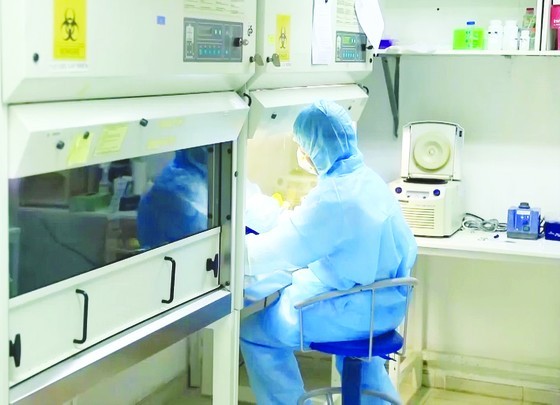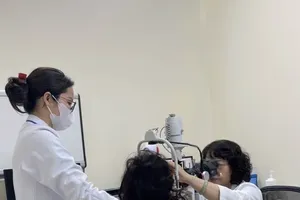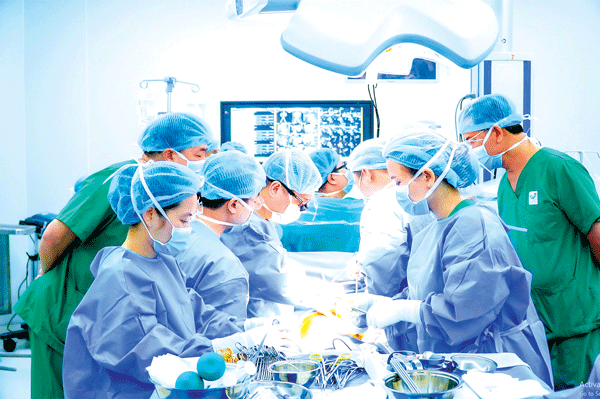The Department of Preventive Medicine under the Ministry of Health sent an official dispatch to the Ho Chi Minh City-based Pasteur Institute, the HCMC Department of Health, the departments of health in Dong Nai and Binh Duong on strengthening the prevention of monkeypox epidemic after recording 2 cases of monkeypox in the two southern provinces.
 |
A medical staff at the Pasteur Institute in Ho Chi Minh City is doing PCR tests for monkeypox virus. |
The Department of Preventive Medicine said that through the infectious disease surveillance system, a 25-year-old in HCMC on September 23 tested positive for monkeypox. The man hails from Dong Nai Province’s Xuan Truong Commune and temporarily is residing in Ho Chi Minh City’s Go Vap.
After discovering the disease, the male patient added that in the three weeks before the onset of symptoms, the patient only stayed in Vietnam and did not go abroad. Immediately upon receiving the information, the Ho Chi Minh City Center for Disease Control (HCDC) conducted an epidemiological investigation including patients’ travel history. HCDC also made a list of 8 people in close contact with the patient including 4 people in Ho Chi Minh City, one person in Binh Duong, and three people in Dong Nai.
Worse, among these 8 close contacts, one is the patient's 22-year-old girlfriend in Binh Duong Province who also tested positive for monkeypox on September 24, and is currently quarantined for treatment while the remaining close contacts are currently stable, with no unusual symptoms.
To promptly monitor and detect disease cases early as well as prevent monkeypox outbreaks, and minimize the number of infections and deaths, the Ministry of Health requested departments of health of the above localities to strengthen supervision. Healthcare watchdogs in these cities and provinces should carry out an investigation of the above positive monkeypox cases’ close contacts to determine the source of infection for further control of the disease and curb the widespread into the community.
Director of Ho Chi Minh City Department of Health Associate Professor Tang Chi Thuong said that infected people are currently quarantined and treated in the Hospital for Tropical Diseases in accordance with regulations of the Ministry of Health. The Health Department directed HCDC to continue coordinating with their peers in CDC Binh Duong and Dong Nai to investigate the epidemiology, especially the travel and contact history of the patient to promptly prevent the risk of spread in the community. Medical workers are instructing close contacts to self-monitor their health at home for 21 days.
According to Dr. Thuong, Vietnam has so far recorded 4 cases of monkeypox. The two previous cases tested positive after returning from abroad. Regarding the two new cases in Binh Duong and Dong Nai, epidemiological investigation has not found any factors related to foreign countries; hence, the source of infection is domestic, said Associate Professor Dr. Tang Chi Thuong.
According to Head of the Internal Medicine Department of Ho Chi Minh City Tropical Diseases Hospital Huynh Thi Thuy Hoa, monkeypox spreads from person to person through close contact with someone who is infected with the monkeypox virus. Close contact includes being face-to-face (such as talking or breathing close to one another which can generate droplets or short-range aerosols); skin-to-skin (such as touching or vaginal/anal sex); mouth-to-mouth (such as kissing); or mouth-to-skin contact (such as oral sex or kissing the skin) including sexual contact. For most people, monkeypox gets better on its own without treatment and symptoms can be managed at home whereas someone who tested positive for monkeypox has died following complications.
According to Associate Professor Tran Dac Phu, Senior Advisor to the Vietnam Public Health Event Response Center, the health sector must have a timely response accordingly so as not to lose control of the epidemic, but also not to waste resources because, at this time, the country is experiencing many other epidemics outbreaks such as dengue fever, hand, foot and mouth disease. In his point of view, it is necessary to continue to strengthen border gate surveillance, people returning from epidemic areas, community surveillance with patient records and other places.
Above all, medical facilities should try their best to treat positive cases to curb deaths and avoid cross-infection among medical staff during the care and treatment process. Media communication should be conducted to raise people’s awareness about the epidemic situation and prevention measures to avoid unnecessary public worry.
Last but not least, medical staff at all medical establishments should receive training on treating and preventing monkeypox infections. The Pasteur Institute of Ho Chi Minh City should increase timely professional and technical support and guidance for localities in monitoring, sampling, diagnosing zoning and handling monkeypox outbreaks.
The Ministry of Health has also issued recommendations for respiratory hygiene/cough etiquette including covering a person’s mouth and nose with a cloth or handkerchief or disposable tissue or sleeve when coughing or sneezing, it is best to cover your mouth and nose when coughing or sneezing and performing hand hygiene (e.g., hand washing with non-antimicrobial soap and water, alcohol-based hand rub, or antiseptic hand wash).
If someone is suspected or confirmed as having monkeypox, they should isolate until the scabs have fallen off and abstain from sex, including oral sex. Moreover, they should come to medical clinics for timely monitoring.
Medical workers advised people to avoid contact with objects and materials that an infected person has used. People should not share eating utensils or cups with a person with monkeypox. If someone is suspected or confirmed as having monkeypox at a person’s residence or workplace, it is necessary to notify the health authority for timely advice and treatment, without self-medication.
People traveling to countries where monkeypox is endemic such as Central and West Africa should avoid contact with mammals (dead or alive) such as rodents, marsupials, and primates that may contain the monkeypox virus. After returning to Vietnam, they need to report their travel history to a monkeypox-endemic country so that local health authorities can take measures.
























